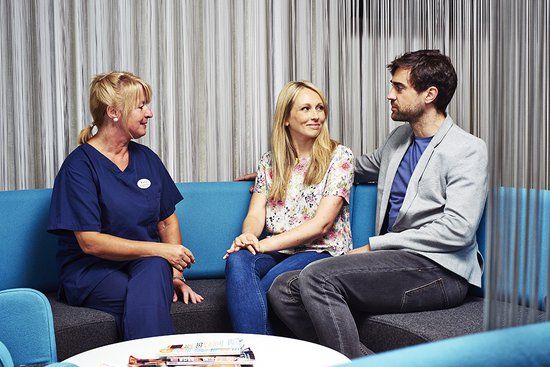
During IVF, the focus is often on the woman and her emotional needs. But what about the needs of the male partner?
In this second blog in our mini series on health and wellbeing, we talk about the impact of IVF treatment on the male partner, in particular if you need to use a sperm donor, and how we support you both through your journey:
Coping with the diagnosis
Feelings of guilt, frustration, failure – all of these are commonly reported when you realise that you need help as a couple to have a child. If the diagnosis reveals the cause to be a sperm disorder, it can be difficult to come to terms with, you may feel it’s your ‘fault’ and you’re to ‘blame’ for putting your partner through IVF and all the procedures it entails. All of these are natural feelings. But you can be reassured that you’re not alone. Around a third of all cases of infertility are caused by male factor issues. And the good news is that there are treatments to help, even if you aren’t producing any sperm at all. We have the expertise to help you become a father, both through using your own sperm and that of a sperm donor.
Professional support network
You may not want to confide in family and friends about your diagnosis and treatment, but it’s important that you have some form of support network in place. Infertility treatment can take a toll on even the strongest of relationships, it’s not unusual to want to shield your partner from your own emotions, because they’re already going through enough, which can lead to a sense of isolation even though you’re facing treatment together. You may also feel under pressure for treatment to be a success, especially because of the financial implications of private IVF.
It’s why we emphasise counselling at Manchester Fertility. Our counselling team has many years of expertise in guiding couples through the ups and downs of treatment, and are here right from the start to make sure you and your partner are both fully prepared for your journey and how it may affect you both, regardless of the outcome. This support is crucial and we’ve seen many times just how much our patients value it.
Counselling is mandatory if you need to use a sperm donor to have a baby, but it’s available to you at any point of your treatment. Confidential and private, you can see our counsellors on your own and with your partner. You can also talk to any of our team at any time.
Using a sperm donor
If your only hope of having a child is through the use of a sperm donor, you may have additional concerns: Will I bond with the child? How do I know the sperm is of high-enough quality? Will I still feel part of the treatment journey?
At Manchester Fertility we make sure that you’re involved every step of the way, just as you would be if your own sperm was being used.
You will both be able to choose the right sperm donor for you with the help of our dedicated Donation Team, with the reassurance of knowing that only healthy, fertile men with the highest quality sperm are accepted as sperm donors into our successful programme. You both also attend counselling to ensure that you understand the implications of using a sperm donor, where you can discuss your feelings about your diagnosis in confidence.
All Manchester Fertility sperm donors:
- Are aged 18-41 and health screened according to strict HFEA standards
- Are fully-identifiable so your child can apply to HFEA to find out who they are in future
- Donate exclusively to our clinic
- Fully understand their rights and responsibilities as a licensed clinic sperm donor
- Are altruistic and have a desire to help other men to have children
- Have completed detailed personal profiles including a goodwill message to you and any child you have
Treatment outcome
What if treatment fails? At Manchester Fertility, you’re not just put back to the start and advised to ‘just try again’. A negative outcome is always assessed in detail by our specialist consultant team, with a one-to-one meeting with your consultant booked in for both of you. It’s important to remember that whilst IVF success rates may be high, there could be any number of factors why on this occasion it didn’t work, and often it can be difficult to identify one specific reason why the cycle has failed. Factors such as age, lifestyle (weight, smoking and alcohol intake for example), sperm quality, egg quality, embryo quality and embryo transfer can all have bearing on the outcome. We look to see if there are any changes to treatment protocol we can make, and give you a realistic idea of likely future chances of success. You’re also again both offered additional support and counselling so you can decide your next steps together.
If you’d like to know more about treatments for male infertility, read our Guide for Men. If you’d like our help to have a baby, call our Patient Advisors on 0161 300 2737 to get started or use our discreet Live Chat service available via our Homepage during clinic hours.
In our final blog post on health and wellbeing, we’ll be talking about how to minimise the financial stress of private IVF.
Last updated: 3rd August 2016








